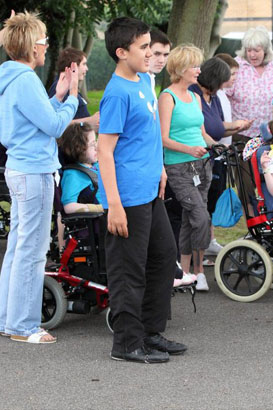
Up-to-date information about the expertise and training of staff to support children/young people with SPECIAL EDUCATIONAL NEEDS, including how specialist expertise will be secured, must be published in the annual SEN Information Report by the governing bodies of maintained schools and maintained nursery schools and the proprietors of academy schools (0-25 SEND Code of Practice, 2015, section 6.79).
It is expected that SENCOs will work with their headteacher, through provision management (eg provision mapping), to identify special educational needs/disability training needs and priorities, and take a role in training educators of children/young people with special educational needs/disability to enable them to fulfil their obligations under the Children and Families Act 2014 (Special Educational Needs and Disability Regulations 2014, nos 50 (3: c,e)).

It is logical to train staff to different levels of expertise depending on their level of contact enabling them to respond appropriately to pupils with particular types of special educational need/disability. The 0-25 SEND Code of Practice (2015, section 4.32) suggests three levels:
- Awareness: a basic awareness of the needs of someone who has a particular type of special educational need/disability for all staff likely to come into contact with them;
- Enhanced: the knowledge, understanding and skills to adapt teaching and learning to meet the needs associated with a particular type of special educational need/disability on a regular basis;
- Specialist: in-depth knowledge, understanding, skills and practice in working with people with a particular type of special educational need/disability, that enables them to train, advise and support other staff.
The support and intervention provided should be selected to meet the outcomes identified for the child, based on reliable evidence of effectiveness, and provided by practitioners with relevant skills and knowledge (CoP, section 5.40).
Careful consideration needs to be given to how specialist staff can train the
wider workforce. Training
a range of staff to different levels ensures a level
of expertise is retained within the school even if a highly trained member of staff
leaves.
It is important to remember the wide range
of activities that is covered by 'continuing
professional development' in addition to
traditional training including:
- Peer-to-peer support;
- Professional observation opportunities;
- Mentoring;
- Coaching;
- Shadowing;
- Inquiry/research.
'The quality of teaching for pupils with SEN, and the progress made by
pupils, should be a core part of the school's performance management arrangements
and its approach to professional development for all teaching and support staff.'
(CoP, section 6.4)
In the table on the right, the Dyslexia-SpLD Trust has further differentiated levels of knowledge, skills and under-standing in an alternative way.
*Teachers working at this level would be expected to be qualified to undertake full cognitive diagnostic assessments for dyslexia-SpLD.
| Stages | Type of Support | Professional Roles |
| Stage 1 | Universal | All staff teaching and supporting learners in all levels of |
| Stage 2 | Targeted | Practitioners confident with planning, preparing and teaching with a range of targeted specialist and differentiated resources Practitioners in specialist settings |
| Stage 3 | Targeted Strategic |
Higher Level Teaching/Special Assistant in all settings Specialist SEN Teacher SENCO Teacher in main stream seeking to specialise in dyslexia/specific learning difficulties CPD leader for teaching schools |
| Stage 4 | Specialist |
Dyslexia/Specific learning difficulties (SpLD) Specialist Teacher Dyslexia/SpLD Advisory Teacher Specialist Teacher Assessor |
| Stage 5* | Specialist Complex |
Specialist Teacher Assessor Dyslexia/SpLD Advisor Dyslexia/SpLD Trainer |
Local authorities must work to integrate educational provision and training provision with health and social care provision where they think that this would promote the well-being of children/young people with special educational needs/disabilities or improve the quality of special educational provision (0-25 SEND Code of Practice, 2015, section 3.13).
As well as the Children and Families Act 2014, the Care Act 2014, Health and Social Care Act 2012, and the NHS Act 2006 also place an obligation on health bodies and the local authority to promote the integration of services.
In addition to statutory training, support for children/young people with special educational needs/disabilities is strengthened when specialist staff (eg educational psychologists, speech/language therapists, school nurse, etc) and parents train the educational workforce in identification and early support resulting in:
- More timely identification of need;
- Appropriate responses and actions;
- Effective support offered earlier;
- Managing health conditions and technologies.
(0-25 SEND Code of Practice, 2015,
section 3.41, 3.62, 3.63)
Early years providers, schools and colleges are responsible for deciding what external support to seek and for setting their own priorities for the continuous professional development of their teaching and support staff (0-25 SEND Code of Practice, 2015, section 41).
However, professional development recommendations from the 0-25 SEND Code of Practice (2015) relating to pupils with special educational need/disabilities include:
- Quality teaching (section 6.4);
- Inclusive learning environments (section 5.5);
- Identification, assessment and planning for the needs of children with special educational needs/disabilities (section 5.5, 9.26);
- Assessing, monitoring and reviewing pupil progress (section 6.4);
- Early support key working (5.17);
- Special educational need/disability-specific training (eg positive behaviour support to support children with challenging behaviour) (section 9.92).
To read a more detailed explanation of the Dyslexia-SpLD Trust levels of expertise, click here; and here for associated online dyslexia-SpLD screening and assessment training materials.
For whole school approaches, recommended in the 0-25 SEND Code of Practice (2015,
Appendix 2), click here.
The Education Endowment Fund (EEF)/Sutton Trust provide evidence-based, effectiveness-rated guidance on educational interventions for both primary/secondary and early years phases.
One way of mapping specific workforce development needs (Preparing for Adulthood,
2014) is
shown below:
| Priorities | Elements of training |
| Policy context | Overview of legislation and Code of Practice (including role of SENCOs) Operational elements - Local Offer and EHC Plans Links between SEN and disability reforms and wider changes (e.g. funding reforms) |
| Person-centered planning | Principles of effective key working - covering four key working functions Coordination and facilitation of multi-agency meetings Potential for negotiation/conflict mediation training |
| Personal budgets | Overview of legislative background Calculating resource requirements Managing delivery of Personal Budgets (including providing support to parents if required) |
| Outcomes |
Defining outcomes |

Cathy O'Connor (Wirral Education Psychology Team) created the slide, 'Developing an EHC approach' as part of her 'The Lonely SENCO: Planning for September 2014' presentation. It represents an ethos shift accompanying the new 0-25 SEND Code of Practice (2014) and the new Education, Health and Care Plans.
Click here to view the text of her slides.
Consider the areas she has highlighted below. What could this look like for your school or other education provider?
Develop a training presentation for your school's staff to explain and support this person-centred approach to planning a young person's future?
Legislation and guidance
- Children and Families Act 2014
- The Special Educational Needs and Disability Regulations 2014
- Special Educational Needs and Disability Code of Practice: 0-25 years (Department for Education, 2015)
Media
Other publications
- Cathy O'Connor (2014) 'The Lonely SENCO: planning for September 2014' (Presentation). Bromborough: Wirral Education Psychology Team.
- Preparing for Adulthood Programme (2014) PfA Factsheet: The links between
the Children and Families Act 2014 and The Care Act. London: The National Development
Team for inclusion and the Council for Disabled Children. [Online at: http://www.councilfordisabledchildren.org.uk/media
/548760/Care-Act-and-CFA-link-PFA-2014.pdf; accessed: 28.10.14]